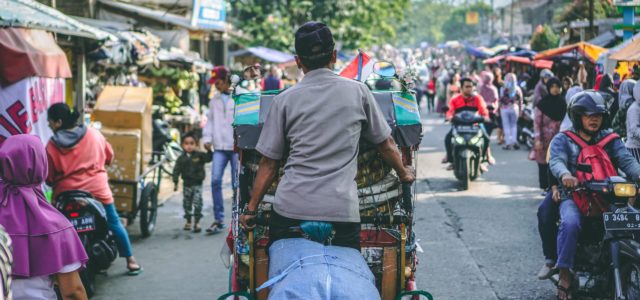Maria Sarah
During the pandemic, office employees, ride-hailing drivers, and street vendors in Indonesia are all affected by social distancing policies, which include work-from-home. But unlike for most office employees in the formal sector, for ride-hailing drivers and street vendors in the informal sector, the new measures mean loss of customers and unemployment.
The government has proposed the Pre-employment card program to alleviate the burden of unemployed formal and informal workers. However, due to the program’s high reliance on the Internet and Indonesia’s digital divide, a fundamental question must be asked, how effective is it for the informal sector?
Indonesia’s Informal Sector – the most vulnerable?
55.72% of Indonesia’s workers are informal. According to the International Labor Organization, informal workers are unregistered, unregulated, do not receive worker’s benefits or social protection. Informal jobs like street vendors and ride-hailing drivers that depend on day-to-day customers have become vulnerable because of the new social distancing policies. This is because the measures encourage people to stay home, which results in a drop in the number of customers for informal workers, leaving them with almost no income. For example, Basuki is a ride-hailing driver who experienced a reduction in orders and income after the government asked people to stay at home.
“If the government wants to restrict the movement of people, please think about the fate of workers like us…If we don’t work, we can’t eat.” Basuki said.
Without income, they essentially become unemployed. This creates a problem as informal workers do not receive severance pay or unemployment assistance. Therefore, it is crucial that the government does not only impose restrictions but also help the unemployed during the pandemic. The existence of both formal and informal sectors poses a challenge for the Indonesian government to propose a solution that would cater to everyone’s needs. This is why the new program has raised concerns if this is the right measure for informal workers.
The Government Response
The Pre-Employment Card Program was recently implemented to tackle unemployment by providing subsidized online training and additional cash benefits. The program requirements are minimal and target informal and formal workers of micro- and small enterprises impacted by the pandemic.
It works in three steps: First, eligible participants sign up online. Second, qualified participants receive non-cash credit that can be used to buy an online course of their choice on the 8 digital platforms, which the government has partnered with. A variety of courses are available ranging from learning a new language, graphic design, computer science to how to become a coffee barista, hairdresser and hotel receptionist. Third, after completing a course, the participant receives a monthly payment of Rp 600,000 (€36.6) for four months in their bank account, which can be used to buy basic necessities.
The program is highly reliant on digital platforms and the Internet. This poses a challenge in Indonesia, as the technology needed to access these trainings remains out of reach by many Indonesians due to the digital divide.
The Digital Divide
The digital divide is the gap between those who have access to the Internet and computer and those who do not. In Indonesia, Internet access depends on one’s socioeconomic status, educational attainment, and age.
First, a survey in 2017 by the Indonesia Internet Service Provider Association (IISPA) found that high socioeconomic status households are more likely to have Internet access, while only 21.72% of the total low socioeconomic status households have Internet access. As informal workers tend to belong to low-income groups of the population, it is not likely that they have Internet access. This means the program has the potential to exacerbate existing inequalities as the program leaves the poorest behind.
Second, according to the same IISPA 2017 survey, those who have a high school, bachelor’s or master’s degree have more Internet access, whilst only 5.45% of those without any form of schooling use the Internet. A study done by the Asian Development Bank (ADB) found that informal employment is linked to lower educational attainment. Therefore, the likelihood of the program reaching informal workers who really need assistance is low.
Third, another finding found by IISPA 2017 is that less than 50% of people within the age group of 35-54 have Internet access. The ADB study also revealed that middle-aged workers (24-54 years old) make up the largest group of Indonesia’s informal economy. This indicates that the benefit of the program will disproportionately accrue in younger workers rather than older workers in the informal sector who lack Internet access.
Driver of Inequality?
Indonesia’s digital divide means that the program will have unequal reach. Individuals with low socioeconomic status, low educational attainment and are older are less likely to have Internet access. As informal workers tend to fall under these demographics, they are less likely to have access to the Internet and thus, the program. This imbalance of program disbursement can aggravate inequality in Indonesia because the most vulnerable are excluded from government aid.
In contrast, the digital platforms partnered with the government are benefiting massively from this program. This is because a large portion of public money flows to the private sector when program participants buy courses from the digital platforms. In fact, two of the digital platforms are unicorns, which are companies with a value of over $1 billion, demonstrating that the rich are actually benefiting from this program which can exacerbate inequality.
While the Pre-employment card program is well-intended, it is not the right initiative for vulnerable groups during this pandemic. The technology necessary for the program remains inaccessible to many informal workers due to the digital divide. Therefore, the government needs to re-evaluate whether this program is a savior or a driver of inequality.
Maria Sarah is a MSc Public Administration student at Leiden University. She grew up in Indonesia, Oman and Germany and moved to Canada in 2016 for her BA in Economics at McGill University.
Image Credit: Unsplash
